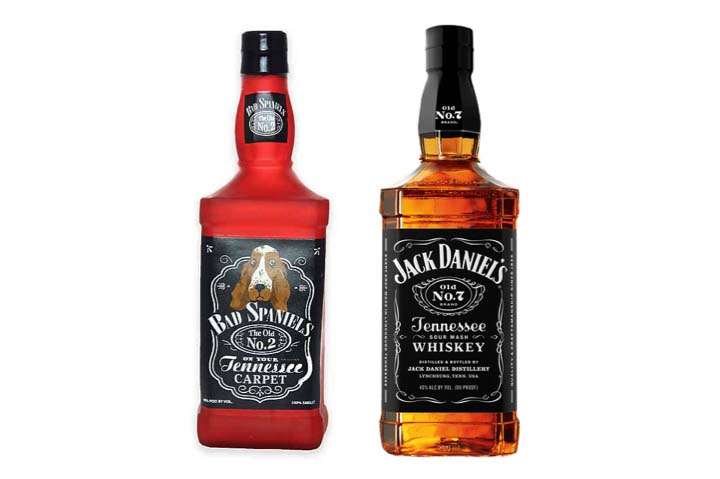June 23, 2023
Poop-Themed Dog Toy Doesn’t Pass Smell Test, Supreme Court Rules
The toy, which parodied a bottle of Jack Daniel’s whiskey, isn’t protected under the First Amendment because it was commercial, rather than expressive, speech.
A poop-themed dog toy and an iconic American whiskey brand are at the center of a recent Supreme Court ruling with potential implications for the promotional products industry. The case, legal experts say, has relevance for brand owners and entities that would seek to parody trademarks held by those brands.
The court battle involved Jack Daniel’s Properties, owners of Jack Daniel’s Tennessee Whiskey, and VIP Products, a provider of pet toys. Jack Daniel’s had sued VIP, alleging that a dog chew toy that VIP was selling constituted trademark infringement. VIP had argued that it was protected under the First Amendment because its product was a commentary on alcohol brands “self-serious” advertising and the “joyful humanization” of dog owners’ pets.

A Bad Spaniels parody dog toy next to a bottle of Jack Daniel’s.
The Supreme Court, in a 9-0 decision earlier this month, sided with Jack Daniel’s, reversing a U.S. appeals court decision. According to the decision, VIP wasn’t using its “Bad Spaniels” trademark just to parody the whiskey company, but to sell a dog toy – constituting commercial speech, which is less protected than free speech.
The parody pet toy was in the shape and style of a Jack Daniel’s whiskey bottle, with a label that reads “Bad Spaniels – The Old No. 2 on Your Tennessee Carpet,” a play on the “Old No. 7 Tennessee Whiskey” label on a Jack Daniel’s bottle. The chew toy also included the line “43% poo by vol.” and “100% smelly” in small print at the bottom of the label – similar to Jack Daniel’s labels, which note that the product is “40% alc by vol. (80 proof).”
Jack Daniel’s argued that VIP’s products were misleading, since consumers may be confused about who manufactures the toys due to their similarities to a bottle of Jack Daniel’s.
In its decision, the Supreme Court noted that the Rogers test – often applied to protect free speech in trademark cases – didn’t apply in the “Bad Spaniels” case. As Justice Elena Kagan put it, the test is “not appropriate when the accused infringer has used a trademark to designate the source of its own goods – in other words, has used a trademark as a trademark.”
The Rogers test was established to protect free speech and the use of trademarks. Essentially, the test finds that the non-commercial use of a company’s trademark is protected under the First Amendment as an “expressive work” unless it’s found that either the parody has no artistic relevance to the underlying work or that the source of the parody is explicitly misleading.
The Supreme Court decision will force companies to be hyper-aware of parody branding, especially when they’re selling products for a profit, legal experts say.
Whether or not promotional products pros are creating their own parody products, it’s worth keeping an eye on trademark cases like this. Creating a logo or graphic that infringes on a legally held trademark can result in a lawsuit. Patagonia and Trader Joe’s, for example, recently sued a web-based T-shirt seller for infringing on their trademarks.
